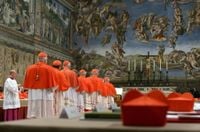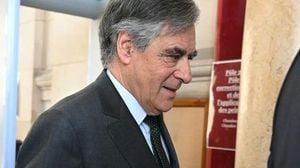On May 7, 2025, the Vatican will witness a significant event as the conclave to elect a new Pope commences, following the death of Pope Francis, who passed away at the age of 88 due to serious illness. His burial took place on April 26, 2025, at the Basilica of Santa Maria Maggiore, in accordance with his wishes for a simple tomb. The upcoming conclave will be a pivotal moment for the Catholic Church, as cardinals from around the world gather to select the next leader of the faith.
Only cardinals under the age of 80 are permitted to vote in the papal election, and currently, there are 135 eligible cardinals worldwide. However, it has been noted that at least one cardinal has declared he will not attend the conclave. This event marks a critical juncture for the Church, as it prepares to transition into a new era of leadership.
The decision to commence the conclave on May 7 is guided by the regulations set forth in the Apostolic Constitution "Universi Dominici Gregis," originally established by Pope John Paul II and later updated by Pope Benedict XVI. According to these regulations, the conclave must begin between the 15th and 20th day following the Pope's death, after a nine-day period dedicated to prayer for the deceased pontiff.
As the cardinals prepare for the conclave, they must wait a full 15 days for all eligible voters to arrive, with a maximum allowance of 20 days if there are valid reasons for delays. The Self-Sacrifice "Normas nonnullas" also permits the cardinal electors to begin the conclave earlier if all voters are present, underscoring the urgency of the election.
On the morning of May 7, all participating cardinals will attend a solemn Mass known as "pro eligendo Pontifice," which translates to "for the election of the Pope." This Mass will be presided over by Cardinal Giovanni Battista Re, the Elderly Cardinal of the delegation. Following the Mass, the cardinal electors will proceed to the Sistine Chapel, where the actual voting process will take place.
Once inside the Sistine Chapel, each cardinal elector will take an oath, pledging to uphold the responsibilities of the papacy and to maintain absolute secrecy regarding the election proceedings. This oath is outlined in paragraph 53 of the Apostolic Constitution. The Head of the Papal Liturgical Office will then declare "extra omnes," signaling that all non-participants must leave the chapel.
During the conclave, the cardinal electors will adhere to strict protocols, including refraining from any form of communication outside the chapel. They will not send or receive messages, read newspapers, or watch television. This ensures that the election process remains confidential and focused solely on the task at hand.
To successfully elect a new Pope, a candidate must receive two-thirds of the votes from the electors present. If the total number of voters is not divisible by three, an additional vote is required. The voting process is meticulously structured, allowing for one vote on the first day if voting begins in the afternoon, and two votes each morning and afternoon on subsequent days.
After each round of voting, the ballots will be burned. If no candidate emerges after a vote, black smoke will rise from the chimney of the Sistine Chapel, signaling to the public that no decision has been reached. Conversely, if a new Pope is elected, white smoke will billow from the chimney, indicating that a consensus has been achieved.
If the cardinal electors fail to agree on a candidate after three days of voting, they are permitted to take a break for a maximum of one day. This time can be used for prayer, discussion, and spiritual guidance from the Cardinal Dean of the Deacon Board, currently Cardinal Dominique Mamberti.
Once a new Pope is elected, the last cardinal of the Cardinal Deacons will summon the Secretary of the Cardinal Delegation and the Head of the Papal Liturgical Office into the Sistine Chapel. Cardinal Giovanni Battista Re will formally ask the elected candidate if he accepts the election according to canon law, and upon receiving consent, will inquire about the name the new Pope wishes to adopt.
This marks a pivotal moment, as the newly elected Pope will then have full authority and power over the Universal Church. The conclave will officially conclude at this point, and the cardinal electors will express their respect and pledge obedience to the new Pope.
The announcement of the new Pope will be made by the Cardinal Dean of the Deacon Board, who will declare to the faithful, "Annuntio vobis gaudium magnum; Habemus Papam," meaning, "I announce to you a great joy; we have a Pope." Following this announcement, the new Pope will deliver the Urbi et Orbi Apostolic Blessing from the main balcony of St. Peter's Basilica, marking his official introduction to the world.
As the Catholic Church prepares for this significant transition, the upcoming conclave serves as a reminder of the enduring traditions and processes that guide one of the world's oldest institutions. The election of a new Pope is not merely a change in leadership; it represents a moment of reflection, hope, and renewal for millions of Catholics worldwide.




